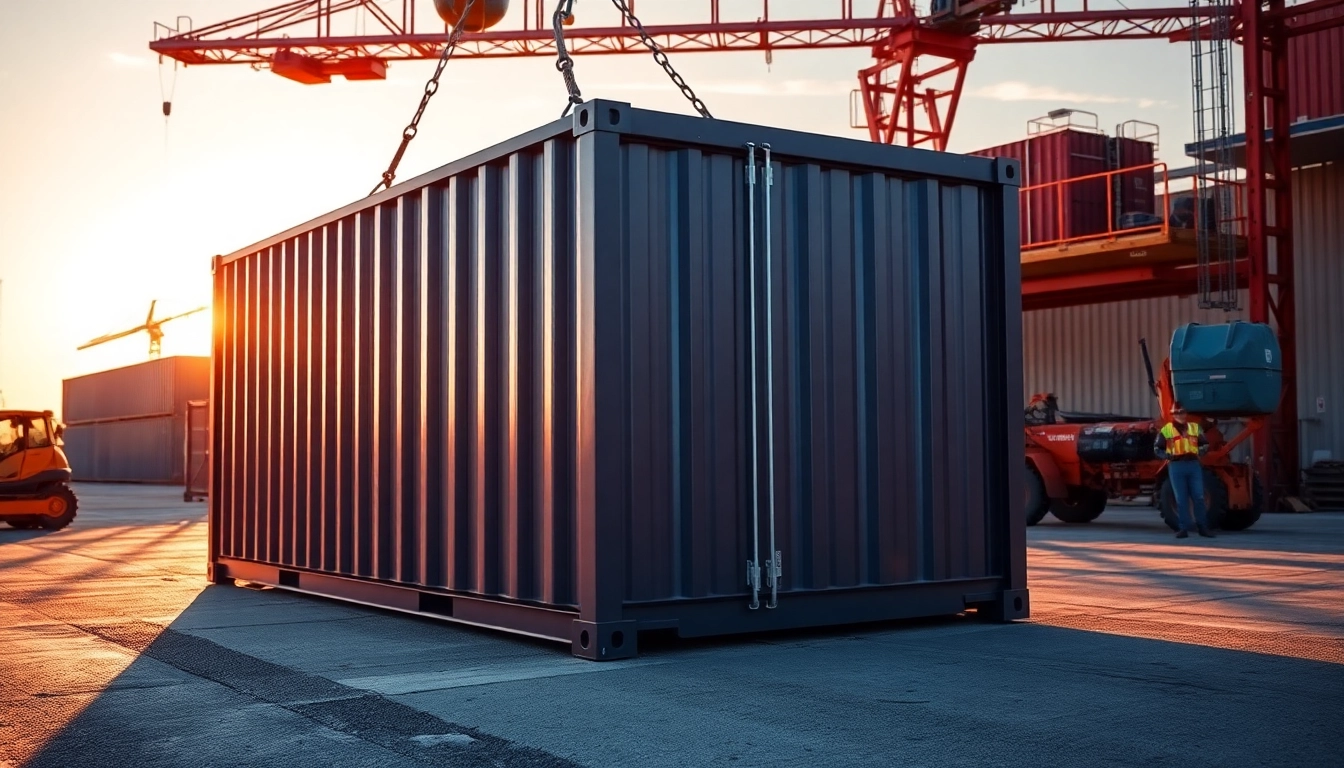Introduction to Container Rental: Concepts and Benefits
In today’s dynamic business landscape and expanding construction sector in the UK, container rental has emerged as an essential solution for storage, logistics, and on-site accommodation. Whether managing large-scale construction projects, organizing logistics for shipping, or improving site efficiency, rental containers offer flexibility, cost savings, and security. The convenience of adjustable rental periods and diverse container options makes them an attractive choice for a broad spectrum of industries. For those seeking reliable and affordable options, exploring the intricacies of container rental can unlock significant operational advantages. To start exploring options tailored to your needs, visit Container rental.
What Is Container Rental and How It Works
Container rental involves leasing ready-made, standardized shipping or storage units for a specified period, providing temporary or long-term storage, transportation, or processing space. The process generally begins with an assessment of the specific needs—such as size, durability, and duration—and selecting a container accordingly. Rental providers handle delivery, setup, and collection, ensuring seamless integration into your operational workflow. This approach eliminates the costs associated with purchasing, maintaining, and permanently storing containers, offering significant financial and logistical efficiency. In the UK, several prominent companies, including Portable Space and Sunbelt Rentals, facilitate this service, providing a range of container types suited for various purposes.
Types of Containers Available for Rent in the UK
Standard Shipping Containers
Most commonly used, these containers are primarily designed for freight and material transportation. Sizes typically range from 10ft to 40ft in length. They are made of durable steel, offering excellent protection against weather and theft, and are ideal for shipping goods or converting into mobile offices or pop-up shops.
Storage Containers
Often identical to shipping containers but configured expressly for stationary storage, these are useful on construction sites, factories, and commercial premises. Features include lockable doors, corrosion-resistant coatings, and customizable interiors. Sizes vary from compact 6ft units to larger 40ft containers.
Specialized Containers
This category includes containers modified for specific uses, such as refrigerated units for perishable goods, tunnel containers for pedestrian access, or offshore containers for marine environments. Some providers also offer insulated or ventilated options tailored to sensitive materials.
Key Benefits of Choosing Container Rental Services
- Cost Efficiency: Avoid large capital expenditure by renting instead of purchasing, with flexible rental terms that match project timelines.
- Flexibility and Scalability: Easily scale storage capacity up or down according to evolving project needs, without lengthy commitments.
- Security: Modern containers feature heavy-duty locks and security measures, safeguarding valuable equipment and materials against theft and vandalism.
- Mobility and Convenience: With professional delivery and pick-up services, containers can be positioned exactly where needed, streamlining logistics and reducing site congestion.
- Versatility: Containers can be employed in various applications—from secure storage to mobile workspaces and temporary accommodation.
- Rapid Deployment: Rental companies often provide quick turnaround, enabling immediate response to project demands, a vital aspect in time-sensitive projects.
Choosing the Right Container for Your Needs
Assessing Your Storage or Shipping Requirements
Start with a comprehensive needs analysis: estimate the volume of materials or equipment to be stored or shipped, assess environmental considerations such as exposure to weather or humidity, and determine the required level of security. For example, a temporary construction site might need robust, lockable storage units, while a logistics company might prioritize high-volume shipping containers for freight movement.
Popular Sizes and Specifications of Rental Containers
- 10ft containers: Compact, suitable for small tools or equipment.
- 20ft containers: The most common size, versatile for storage and shipping.
- 40ft containers: Larger capacity, ideal for bulk storage or overseas shipping.
Additional specifications include type (standard, refrigerated, open-top), insulation options, and security features. Understanding these specifications ensures you select the container best suited to your operational needs.
Factors Influencing Container Rental Costs
- Container Size and Type: Larger or specialized containers typically cost more.
- Rental Duration: Long-term rentals often benefit from discounted rates.
- Location and Delivery: Proximity to the rental provider influences delivery costs.
- Conditions of the Container: New or refurbished units may vary in price.
- Additional Services: Security upgrades, climate control, or specific customization can increase costs.
Best Practices for Secure and Efficient Container Use
Proper Loading, Locking, and Security Measures
Maximize the security of your container by adhering to best practices such as evenly distributing weight for safe handling, avoiding overloading which can compromise structural integrity, and employing high-security lock mechanisms. Consider supplementary security measures like CCTV surveillance or tamper-evident seals for added assurance.
Transporting and Delivery Considerations
Coordinate with your rental provider to ensure clear access routes and suitable lifting equipment are available. Ensure containers are positioned on stable, level ground to prevent movement or damage. For remote or difficult-to-access sites, discuss specialized transport options such as low-loader trailers or crane services.
Maintenance and Inspection Tips
Regular inspections for corrosion, structural damage, or security breaches are vital to maintaining container integrity. Clean containers periodically to prevent rust and deterioration, especially in corrosive environments. Establish a routine inspection schedule, particularly if containers are leased for long-term use, to ensure ongoing safety and compliance.
Cost Insights and Rental Agreements in the UK
Average Rental Prices for Different Container Types
The UK market offers a broad spectrum of pricing, with typical costs ranging from as low as £50 to £300 per month for standard 20ft containers, depending on the rental length and specifications. Short-term rentals (less than three months) tend to be at the higher end, while long-term agreements can leverage discounts. For example, a 20ft steel storage container might rent at an average of £60-£100 per week, with variations based on provider and specific features.
Understanding Rental Terms and Conditions
Most rental agreements specify conditions such as minimum rental periods, delivery and collection fees, maintenance responsibilities, and security deposit requirements. It’s crucial to clarify these terms upfront to avoid unexpected costs. Some providers offer flexible agreements, including pay-as-you-go options or long-term leasing with discounted rates.
Cost-Saving Strategies and Long-Term Deals
- Opt for Longer Rental Periods: Benefit from lower weekly or monthly rates.
- Combine Delivery and Collection: Negotiate bundled service packages for overall savings.
- Maintain the Container: Regular upkeep prevents damage that could incur additional repair costs.
- Compare Multiple Providers: Gather quotes and review contractual details to ensure competitive pricing.
Future Trends and Innovations in Container Rental
Smart Containers and IoT Integration
The integration of IoT (Internet of Things) technology into containers is transforming the industry. Smart containers now feature real-time tracking, remote security alarms, and condition monitoring such as temperature and humidity sensors. This technology allows businesses to optimize logistics, enhance security, and reduce operational risks via remote management platforms.
Eco-Friendly and Sustainable Container Solutions
With increasing focus on sustainability, companies are developing eco-friendly containers featuring recycled materials, solar-powered lighting, and energy-efficient insulation. Some providers are also repurposing decommissioned containers into modular, environmentally conscious structures that serve as offices, cafés, or retail spaces.
The Growing Market for Modular and Custom Containers
The demand for customized, modular container solutions is surging. Clients seek tailored designs that incorporate insulation, electrical wiring, ventilation, or branding elements. Modular systems enable quick assembly of multi-unit complexes, making them ideal for temporary event spaces, educational facilities, or expanded industrial sites. These flexible solutions cater to evolving operational needs and enhance on-site functionality.

